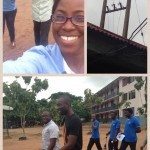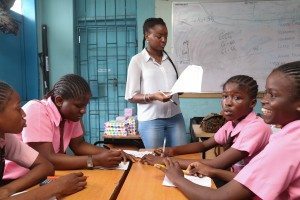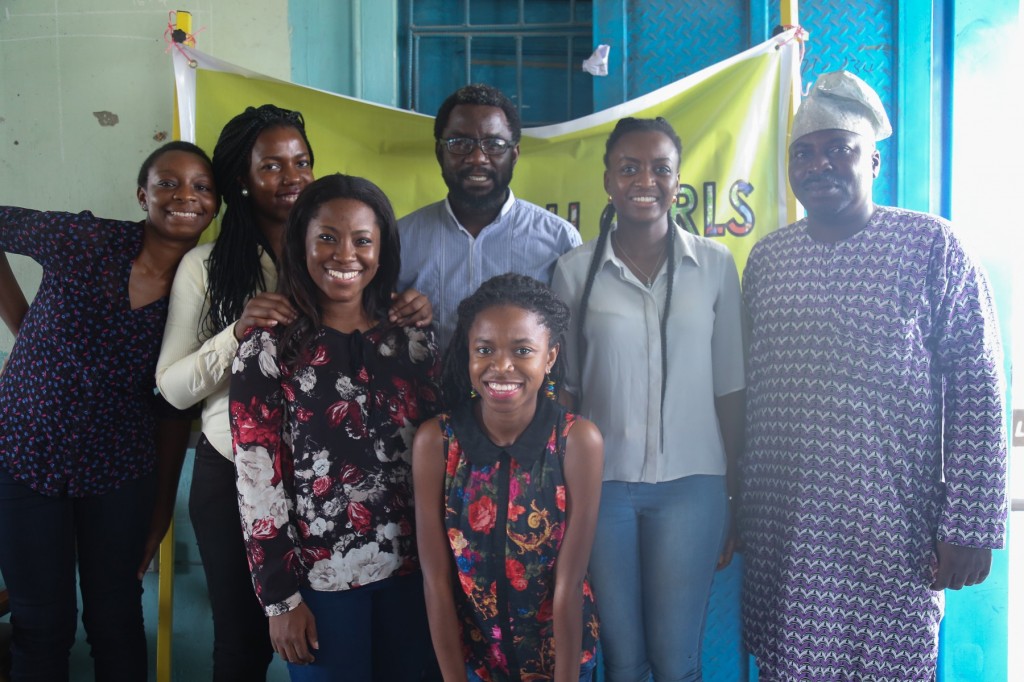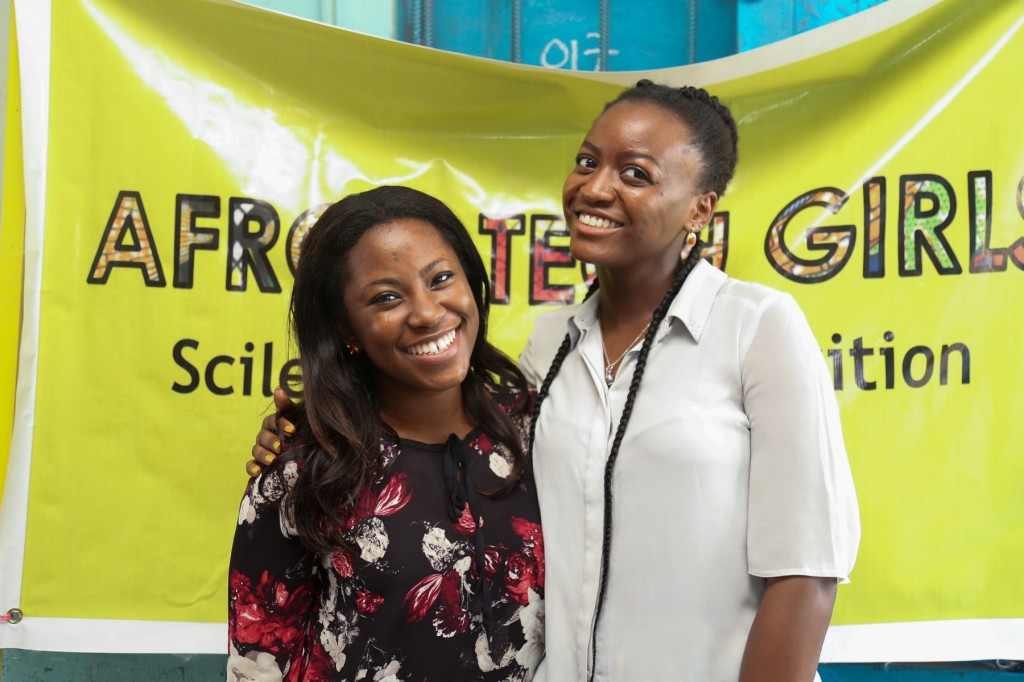Today, we have the pleasure of interviewing Ms. Adeola Shasanya from Lagos, Nigeria. Adeola is currently an Electrical Engineering and Renewable Consultant with the Lagos State Electricity Board. She has worked tirelessly with young girls throughout Lagos State and surrounds to raise awareness and promote STEM careers through the organisation, “Afro-Tech Girls”.
1. Tell us a little about yourself and your work history, particularly focusing around the current energy industry and challenges faced in Nigeria.
I was born and raised in Lagos, Nigeria and have always had a keen interest in the sciences and technology. As a child I gravitated toward activities that had “STEM – Science, Technology, Engineering and Mathematics” at its core, such as puzzles, jigsaws and Lego. Even my cartoons of choice were technology themed; ‘Dexter’s Laboratory’ being my favourite. Having that inclination from an early age, studying Engineering was the natural progression for me. I have a Bachelor Degree in Electrical and Electronics Engineering and a Masters in Renewable Energy and Clean Technology from the University of Manchester.

My work experience to date has been quite diverse within the engineering field. I have worked in construction, technology consulting and energy research which has enabled me to gain a multi-facet view of the industry.
At present I work within the Lagos State Electricity Board. I have been privileged to work on various projects in my time there, focusing primarily on the Lagos Solar Project. This project provides state owned schools and health centres with solar plants as an alternative source of energy. This project was set up to relieve the supply from the national grid, creating more power to consumers.
2. How did you get involved with the IEEE or hear about the IEEE and what benefits has this had on your career?
I first became involved with the IEEE during my undergraduate degree at Covenant University, Ogun State, Nigeria, being a key member of the student chapter. Being a part of the IEEE has impacted me greatly, enabling me to draw on the skills and values I have gained not only in my studies, but also in my work. It has helped me in my research of ‘smart grids’ and renewable energy during my dissertation. During my postgraduate studies I had the pleasure of meeting other IEEE students and professionals through various chapter meetings. This provided me with the opportunity to network with like-minded professionals and call on support for advice.
3. The IEEE is thrilled to see your detailed work engaging particularly females to take up STEM careers. Could you please highlight the challenges you have identified that young females have experienced and what you believe can be done to make STEM careers more inclusive?
Growing up, engineering was always perceived to be a ‘male dominated’ field. The struggle, however, lies in difficulties and challenges facing young women trying to break into industry. Luckily, I was raised around women in my family that had done well in STEM industries despite the various barriers imposed in their time.
In my short career, I have observed numerous challenges to women in STEM careers.
Namely, one of these is the concept of ‘tokenism’. A lot of the time, entire teams or departments will have only one token woman, or just one female representation at senior management level. This often results to a feeling of isolation and a hostile working environment; a direct result of a lack of mentoring. The lack of female representation in the STEM field has meant that many in the coming generations will have no direct pathway on how to achieve their career goals and no one accessible to turn to for such guidance.

To make STEM careers more inclusive, I believe the battle begins in the classroom from the ages as early as five and six. Girls and boys should be given equal encouragement and equal opportunities to take up STEM subjects.
More scholarships and funding of extra-curricular programs and workshops should be made available to encourage female participation. I would love to see such initiatives included on the CSR (Corporate Social Responsibility) programmes of leading firms. I also believe one on one mentoring programs with women in STEM would go a long way to seeing the playing field become more even. This way, girls will have direct access to first-hand information of what it takes to work in the industry and they can better equip themselves for a successful career.
4. You and your colleagues have tirelessly worked with the setup of the Afro-Tech Girls non-governmental organisation over the last couple of years. Could you please outline what initiatives this group does and perhaps what programs and events the group undertakes.
‘Afro-tech Girls’ was created to inspire young girls to become interested in STEM through creativity, art and innovation. We have had various “meet and greet” sessions with some of the Lagos State schools. This was undertaken to gain an insight on how girls see women in technology and also to build a longstanding and meaningful relationship with the girls that we meet.
Earlier this year, we ran a competition called ‘Sciletes’ for senior secondary school girls from various schools across Lagos State. The competition was a quiz based on math, physics, chemistry and biology. Our findings showed that the Lagos state school system provided a genuine pool of intelligent and talented young girls, who with the proper motivation and guidance could develop into valuable contributors within the STEM industry.
We are currently working on a logo competition where girls can design the Afro-Tech girl logo from what they feel a woman in STEM should be like. Later this year, we are planning a full career day which will involve key notes by accomplished women in STEM as well engaging practical exercises.

What advice can you provide to IEEE Young Professionals seeking to make their mark in the world of engineering and technology?
I have always believed that anyone can do anything with the right mental attitude and given the necessary tools and opportunities. I would tell any young lady seeking to build a career in engineering and technology, or in fact anyone who enquires, that hard work and drive cannot be compromised. Focus on your abilities and the opportunities around you, and maximise those rather than looking at what seemingly limits you. Be ever learning and improving. Prepare for opportunities through self-education. There is too much free information through the wonder of the internet to stay uninformed. I would say find a mentor. It doesn’t have to be someone you have access to. It can be a well known public figure, or a CEO, or even a woman you discovered on Linkedin. But it should be someone you can relate to and who is a good example so that you can study their journey.

Do not be limited by anything. The way to overcome fears and limitations is to attempt, so always have a ‘go for it’ attitude. The worst you can be told is no. But rest assured the more you attempt, the better you’re getting and the more you increase your capacity and ability. And finally, never get discouraged. You may encounter lots of trials and knock backs along the way, but gear yourself not to quit and to be in it for the long haul.
For more information on Adeola’s work with ‘Afro-Tech Girls’ please like their Facebook page at; https://www.facebook.com/afrotechgirls
Article edited by Michael Gough, Assistant Editor, IMPACT




